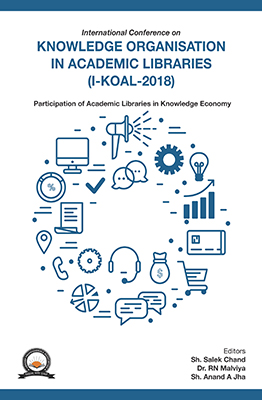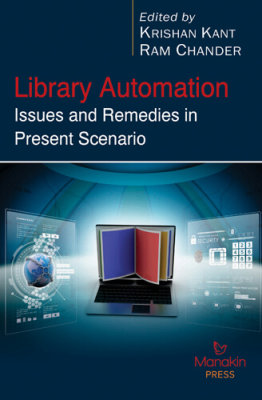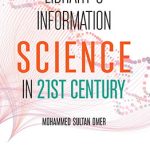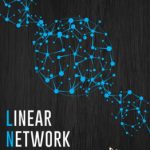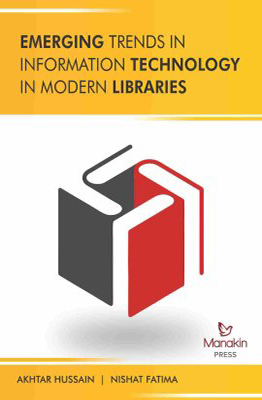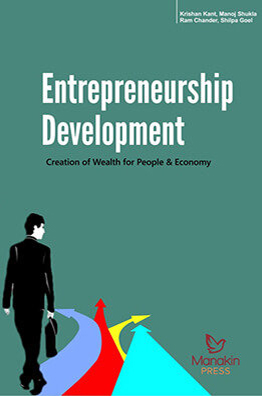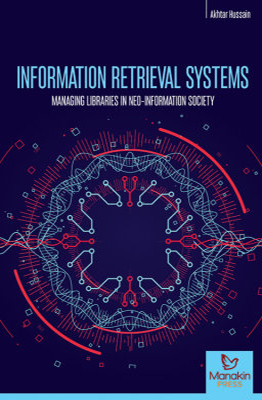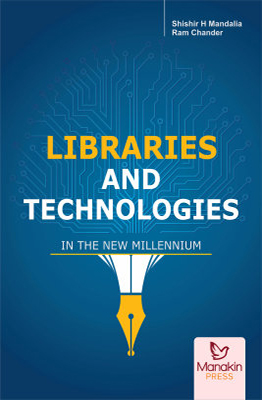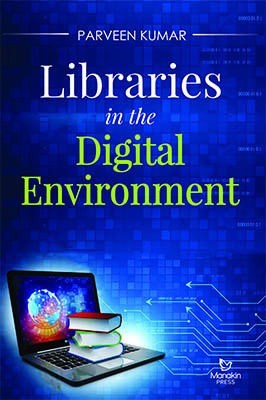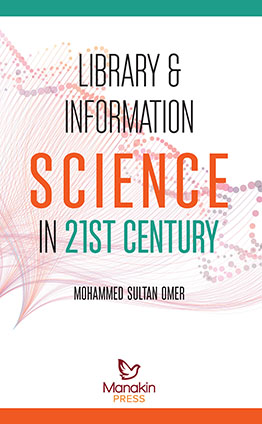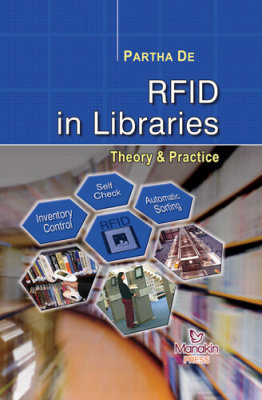Library Automation: Issues and Remedies in Present Scenario
₹1,295.00
Krishan Kant | Ram Chander | Category: Library & Information Science
Binding Type: Hard Binding
Book Details
ISBN: 9789384370343
YOP: 2016
Pages: 344
Order also on
The Beginning of the 21st Century has been called Information Age because of the explosion of information output and information sources. It has become increasingly clear that students cannot learn everything they need to know in their field of study in a few years during stay in the college. To meet the needs of student, we must provide them some latest technology and this can be automated system in the library. The human element is a very important aspect in implementing the automated system in the library. The library and its staff are the focal point and play a very important role in the process of library automation. During the automation process, it is crucial for the library to assure a coordinating role to be aware what is going on globally at all times competence, staff awareness & participation are crucial for the success of the new system or services. Beside this, it is also equally necessary that the library staff should computer literate and professionally experienced, involvement of staff that will be affected at all levels in the new system / service is a pre-requisite for the successful implementation of the automation process. Recognizing this need Aggarwal College Ballbgarh is organizing a two day national conference on library automation. The conference has been designed so as to introduce the participants to the rapidly changing requirement of manpower expertise in two day’s scenario especially in the area of information / document management. The conference will also amiliarize the participants with the process in the library automation.
1. Next Generation Retrieval: Semantic Web and Ontologies
2. Libraries of the Future: Cloud Computing to Fog Computing
3. Perception of Semantic Web Technologies in Libraries
4. Rage Against Machines in the Digital Environment: Attitudes of Librarians Towards Technology
5. Implement of Benchmarking: Essential for University Libraries
6. The Concept of Plagiarism and Anti-Plagiarism Software
7. Plagiarism: Causes, Effects and Prevention
8. Plagiarism and Researchers: A Survey of PhD Students
9. Radical Switch in the Role of Librarians in the Digital Footprint: A Changed Panorma
10. Library and Information Services Through Intranet in Present Scenario
11. Comparative Features of Integrated Library Management Software Systems: AStudy
12. Library Automation Features and Implementation: An Overview
13. Digital Libraries: A Comprehensive Study
14. Digital Library Services and Communities in Academic Libraries
15. Library Automation: Issues and Challenges
16. Libraries in the Digital Age
17. Library Automation: An Overview
18. Promotion of Digital Information in Public Libraries in India
19. The Role of Digital Library in Present Scenario
20. Skills for the LIS Professionals in ICT Environment
21. Application of Information and Communication Technology in Academic Library: An Overview
22. ICT an Essential Tool for Library Automation
23. Importance and Usage of Internet for Library and Information Professionals
24. Management of Library in New Digital Environment
25. Need and Importance of Internet in Resource Sharing
26. Use of Mobile Technology as a New Emerging Phase in Automated Academic Libraries: An Overview
27. RFID: A Case Study
28. Use of RFID Technology in Libraries, its Components and Benefits
29. Library Consortia in India: A Greater Access to the Library Resources
30. Cloud Computing: Distributed Internet Computing for it
31. Library Consortia in Modern Era: An Overview
32. Library Consortium in the Current Era of Communication
33. Library Consortium in India: An Overview
34. The Concept of E-Consortium: In Indian Perspective
35. Effective Use of E-Resources by the Students and Faculty Members: A Study of Jesus and Mary College Library, University of Delhi
36. Remote Access of Electronic Resources for Library Capacity Building: An Experience of National Law University Delhi
37. Open Educational Resources: An Overview
38. Use of E-Resources by the Faculty Members of the YMCA University of Science and Technology
39. Introduction to Library Automation: Issues and Challenges
40. E-Resources: As Revolutionize Instrument in Present Scenario
41. Use of E-Resources and Services in Jawaharlal Nehru Library, Kurukshetra University
42. Cloud Computing: A Perspective Study and its use in Educational Institution
43. Cloud Computing and Libraries
44. Study on Cloud-Based Mass Data Storage of Libraries
45. Free and Open Source Software
46. Zotero: A Reference Management Software
47. Changing Role of Librarians in Digital Library Era and Need of Professional Skills, Efficiency and Competency
48. Collection Development of Academic Libraries in ICT Based Environment: Issues and Challenges
49. Copyright Infringement in India
50. The Changing Shape of Collection in Libraries in Electronic Age
51. Models of Information Seeking Behaviour
52. Evaluation of Information Literacy Program in College Libraries of Uttar Pradesh: A Study
53. Transmuting Libraries in Electronic Environment
54. Role of Library Personnel in New Digital Environment
55. Total Quality Management in College Libraries: A Lis Perspective Approach
56. Role of Total Quality Management in Academic Library
57. A Perspective and Advantages of Open-Sources
58. Role of Social Networking in Digital Era: An Overview
59. Necessity of Multilingual Supportive Functional Model to Effective Online Information Seeking for Academicians
60. Security and Privacy Challenges in Cloud Computing
61. Role of Information Technology in Libraries
62. Challenges and Issues: Migration to Open Source Software
63. Marketing Strategies for Virtual Resources in Electronic Commerce
64. Role of Library Professionals in Today’s Globalized Era
65. Internationalization and Curriculum Development Programmes of Library and Information Science Education
The Beginning of the 21st Century has been called Information Age because of the explosion of information output and information sources. It has become increasingly clear that students cannot learn everything they need to know in their field of study in a few years during stay in the college. To meet the needs of student, we must provide them some latest technology and this can be automated system in the library. The human element is a very important aspect in implementing the automated system in the library. The library and its staff are the focal point and play a very important role in the process of library automation. During the automation process, it is crucial for the library to assure a coordinating role to be aware what is going on globally at all times competence, staff awareness & participation are crucial for the success of the new system or services. Beside this, it is also equally necessary that the library staff should computer literate and professionally experienced, involvement of staff that will be affected at all levels in the new system / service is a pre-requisite for the successful implementation of the automation process. Recognizing this need Aggarwal College Ballbgarh is organizing a two day national conference on library automation. The conference has been designed so as to introduce the participants to the rapidly changing requirement of manpower expertise in two day’s scenario especially in the area of information / document management. The conference will also amiliarize the participants with the process in the library automation.
1. Next Generation Retrieval: Semantic Web and Ontologies
2. Libraries of the Future: Cloud Computing to Fog Computing
3. Perception of Semantic Web Technologies in Libraries
4. Rage Against Machines in the Digital Environment: Attitudes of Librarians Towards Technology
5. Implement of Benchmarking: Essential for University Libraries
6. The Concept of Plagiarism and Anti-Plagiarism Software
7. Plagiarism: Causes, Effects and Prevention
8. Plagiarism and Researchers: A Survey of PhD Students
9. Radical Switch in the Role of Librarians in the Digital Footprint: A Changed Panorma
10. Library and Information Services Through Intranet in Present Scenario
11. Comparative Features of Integrated Library Management Software Systems: AStudy
12. Library Automation Features and Implementation: An Overview
13. Digital Libraries: A Comprehensive Study
14. Digital Library Services and Communities in Academic Libraries
15. Library Automation: Issues and Challenges
16. Libraries in the Digital Age
17. Library Automation: An Overview
18. Promotion of Digital Information in Public Libraries in India
19. The Role of Digital Library in Present Scenario
20. Skills for the LIS Professionals in ICT Environment
21. Application of Information and Communication Technology in Academic Library: An Overview
22. ICT an Essential Tool for Library Automation
23. Importance and Usage of Internet for Library and Information Professionals
24. Management of Library in New Digital Environment
25. Need and Importance of Internet in Resource Sharing
26. Use of Mobile Technology as a New Emerging Phase in Automated Academic Libraries: An Overview
27. RFID: A Case Study
28. Use of RFID Technology in Libraries, its Components and Benefits
29. Library Consortia in India: A Greater Access to the Library Resources
30. Cloud Computing: Distributed Internet Computing for it
31. Library Consortia in Modern Era: An Overview
32. Library Consortium in the Current Era of Communication
33. Library Consortium in India: An Overview
34. The Concept of E-Consortium: In Indian Perspective
35. Effective Use of E-Resources by the Students and Faculty Members: A Study of Jesus and Mary College Library, University of Delhi
36. Remote Access of Electronic Resources for Library Capacity Building: An Experience of National Law University Delhi
37. Open Educational Resources: An Overview
38. Use of E-Resources by the Faculty Members of the YMCA University of Science and Technology
39. Introduction to Library Automation: Issues and Challenges
40. E-Resources: As Revolutionize Instrument in Present Scenario
41. Use of E-Resources and Services in Jawaharlal Nehru Library, Kurukshetra University
42. Cloud Computing: A Perspective Study and its use in Educational Institution
43. Cloud Computing and Libraries
44. Study on Cloud-Based Mass Data Storage of Libraries
45. Free and Open Source Software
46. Zotero: A Reference Management Software
47. Changing Role of Librarians in Digital Library Era and Need of Professional Skills, Efficiency and Competency
48. Collection Development of Academic Libraries in ICT Based Environment: Issues and Challenges
49. Copyright Infringement in India
50. The Changing Shape of Collection in Libraries in Electronic Age
51. Models of Information Seeking Behaviour
52. Evaluation of Information Literacy Program in College Libraries of Uttar Pradesh: A Study
53. Transmuting Libraries in Electronic Environment
54. Role of Library Personnel in New Digital Environment
55. Total Quality Management in College Libraries: A Lis Perspective Approach
56. Role of Total Quality Management in Academic Library
57. A Perspective and Advantages of Open-Sources
58. Role of Social Networking in Digital Era: An Overview
59. Necessity of Multilingual Supportive Functional Model to Effective Online Information Seeking for Academicians
60. Security and Privacy Challenges in Cloud Computing
61. Role of Information Technology in Libraries
62. Challenges and Issues: Migration to Open Source Software
63. Marketing Strategies for Virtual Resources in Electronic Commerce
64. Role of Library Professionals in Today’s Globalized Era
65. Internationalization and Curriculum Development Programmes of Library and Information Science Education
| Weight | 0.56 kg |
|---|---|
| Dimensions | 24 × 15.8 × 1.7 cm |
| yop |
2016 |
| subject-category |
Library & Information Science |
| isbn |
9789384370343 |
Related products
